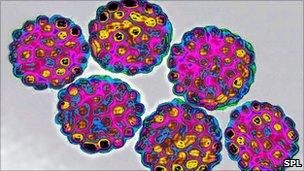Genital warts: NHS 'must vaccinate'
- Published
- comments

The NHS vaccine does not guard against the genital wart virus
The NHS vaccinates teenage girls against cervical cancer with the Cervarix vaccine. It offers good protection, but does not also protect against genital warts.
In this week's Scrubbing Up, two sexual health experts argue that if the vaccine used was changed to Gardasil, teenagers would also get protection from genital warts.
Genital warts are just a cosmetic nuisance, right?
You try telling that to somebody who has just discovered a load of unpleasant 'mini-cauliflowers' in the genital area.
In our long careers as sexual health consultants we can safely say that the patients who discover genital warts are some of the most distressed and upset patients we have ever met. At 135,000 new and recurrent cases per year, it is the commonest sexually transmitted infection dealt with in our clinics.
Imagine our delight then when in 2007 it was announced that there was a vaccine available for the Human Papilloma Virus (HPV) - the virus responsible for genital warts and the government was considering a national vaccination programme.
Saving money?
Unfortunately, there were two vaccines, one which did not cover the genital warts virus at all - Cervarix - and a second vaccine - Gardasil - which covered the viruses that cause cervical cancer, HPV 16 and 18, but also types six and 11 which cause almost 100% of all genital warts in the UK.
We naively thought at the time this was no contest, genital warts cost millions of pounds, as not only do types six and 11 cause warts but they also cause thousands of cervical smears to be classified as abnormal resulting in thousands of visits to GPs, gynaecology departments and sexual health clinics for wart treatments.
The Joint Vaccination Committee recommended HPV vaccination and said that if the vaccines were the same price, Gardasil should be chosen but if Cervarix was considerably cheaper then it might be the option.
The reduction in cervical cancers wouldn't be seen until 2025 whereas in a year of the vaccine programme with Gardasil we would have started to see a reduction in genital warts and started saving millions of pounds not to mention reduction in workload and distressed patients.
Gardasil for our children
It's extraordinary that we are the only developed country in the world, apart from Holland, to have chosen Cervarix for the national programme. The Republic of Ireland did the maths and chose Gardasil.
Australia, which was first country out of the blocks, had a vaccination programme for young women between the ages of 12-26 and within the year of their Gardasil vaccine programme finishing, were already seeing a 47% reduction in genital wart presentation in young women with a corresponding 17% reduction in young men from herd immunity.
A recent Australian study calculated that the only 'danger to Australia in the future would be unvaccinated backpackers' - Brits.
We, as consultants in sexual health, have been told to say nothing publicly that would damage the current vaccine programme as the Cervarix vaccine has already been purchased. We have had to be circumspect in public but in private we have all purchased Gardasil for our own children and advised colleagues to do the same.
'Horse has bolted'
It is sad that a golden opportunity to eradicate the commonest sexually transmitted infection in the UK, has been ignored. This decision will be regretted for many years to come. A small chink of light is the fact that the contract is up for renewal this year.
However, this will only now involve 13-year-olds as the horse has already bolted, with all 13 to 18-year-old girls already vaccinated with Cervarix.
Common sense and economics dictate that the decision to change and use Gardasil needs to be made sooner rather than later.
There are those that say 'So what, genital warts are a punishment for promiscuous behaviour' - that is callous and unfair - even skin contact is enough to transmit HPV; condoms do not prevent transmission or acquisition of HPV so even young women who try to be careful are at risk from this virus.
In our clinics we can only apologise to any young women we see who has had her full three doses of Cervarix and yet presents in great distress with genital warts. This was a bad decision, let's hope the new government will make a re-assessment, taking all the economic and social factors into consideration and reverse this decision.
Neither author has any financial interest in either Cervarix or Gardasil